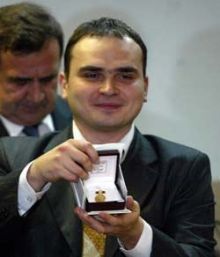The awards ceremony “Sociologist of the Year,” a unique event in Ukraine, was held on Dec. 11, 2007. This is the first award for young scholars established by a scholarly society rather than the state, and the first award that bears the name of a female scholar. Participants had to submit one independently written scholarly work in the form of a journal or anthology article, or monograph. This work had to appear in a registered, print or electronic Ukrainian or foreign publication. In addition, each participant had to write a statement of purpose on the current state of sociology in Ukraine and his/her special place and role in the sociological community. Alternatively, they could write an essay on the scholarly heritage of Nataliia Panina, who conceived the idea of this competition.
In the preface to the book Nataliia Panina: Life, Scholarly Activity, and the Path to the Future the compilers wrote: “Born on December 10 (International Human Rights Day), Nataliia Panina valued human honor and dignity above all and never compromised if she perceived disregard for the standards of personal integrity and professional competence. Everyone knew that she never tolerated a careless, irresponsible, and dishonest attitude to work-whether on the part of an ordinary sociologist or the head of an institute.” For that reason, when the well-known scholars Mykola Churylov, Volodymyr Paniotto, and Yevhen Holovakha, Panina’s intellectual ally and husband, launched this competition, they wanted to consider not only the participants’ scholarly achievements but also their personalities and civic stances. Sociologists are people who hold society to a high standard and issue a diagnosis for it. It is crucial to know what this diagnosis is not just during elections.
When Dr. Holovakha was presenting the awards to the winners (gold medals designed by Viktor Bahlei, an artist-restorer and the head of the Restoration Department at the Museum of Historic Valuables), he said that intelligence, knowledge, and persistence in achieving results, as demonstrated by the young scholars, are precious assets literally worth their weight in gold. The winner of the competition received a gold medal engraved with Panina’s image and 2,500 hryvnias. Two participants received silver medals and 1,250 hryvnias each. Only 10 young scholars reached the second round of the competition, and a winner was chosen from among them. Oleh Demkiv (Lviv) came first, Svitlana Babenko (Kharkiv) took second place, and Andrii Zotkin (Kyiv) came third.
COMMENTARY
Oleksandr STEHNII, sociologist:
“This nationwide competition set a high standard. Right away we saw difficulties. The thing is that many Ukrainian universities offer majors in sociology, but the bulk of applications came from Lviv, Kyiv, and Kharkiv. Why is this?
“Above all, we would like young people to know that we value them. I would like to say that this was not a competition of papers but of the participants’ personalities, professionalism, civic stand, and their level of involvement in the sociological life of Ukraine and the international community.
“In general, the problem in our country is that the number of sociologists with university diplomas is much higher than professional, qualified sociologists. Sociology is a fairly fashionable enterprise today, but research is not an activity for the masses because a researcher has to have a certain dose of talent.
“Another disturbing factor today is that the Ukrainian science of sociology is primarily linked to elections because they are a permanent feature in Ukraine. But sociology is not political science; the sociology of public opinion deals with this range of topics. In contrast, sociology as a scholarly pursuit is the social diagnostics of the life of society. This is what the organizers of the “Sociologist of the Year” award wanted to show, and they succeeded.”
Myroslav POPOVYCH, member of the National Academy of Sciences of Ukraine:
“We witnessed a special initiative on Dec. 11. First, this was a competition organized on a high level by specialists in the field. The titles of the submitted papers compel us to affirm that these are examples of excellent research works in the field of sociology. This proves that young people are taking up scholarship even when the pay is low. One of the last Secretaries General of the CC CP(B)U said that we do not know the society in which we live. But right now we can say that we do know our society, thanks to the many years of unflagging sociological work by scholars who are continuing to monitor society. I believe that this competition will foster the further development of sociology and much more, because it is a great incentive for young people. For them financial reward is less important than recognition.”
Volodymyr PANIOTTO, sociologist:
“I believe that the competition was fairly successful. We do not have many competitions for sociologists, especially young scholars. I think that a medal is a much more conspicuous thing than a financial award or a diploma. Another positive factor was that the commission’s decision was not based on papers alone. The unique feature of this event was that it included an assessment of letters of recommendation, the participants’ personalities, and their civic stances. This added flavor and originality to the competition. Unfortunately, so far not a lot of people have taken part in it. I hope that given wider promotion, this competition will become more popular. It needs to be said that it stimulates scholarly activity in general.
“I would also like to say that in the past sociological research was underused, and thus it was not in demand. But today we have already seen an increase of interest. The development of economic and political markets has stimulated the growth of sociology. Our sociologists have essentially joined international cooperation and our young people are receiving training abroad. Nevertheless, the professional level of Ukrainian sociology is still significantly different from the American standard.”








